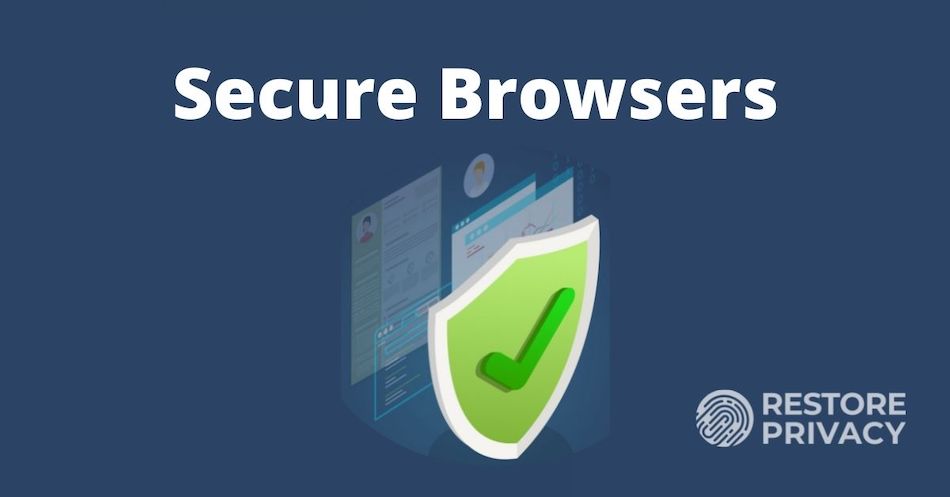
A secure browser that protects your privacy is a critical tool for staying safe online and keeping your data secure from third parties. We have been reviewing, testing, and ranking browsers for the past six years and this guide contains the latest recommendations for 2024.
Do you want a secure browser that truly keeps your data private? Well, you may be surprised by how much of your data is actually getting exposed.
WARNING: Many browsers today are actually data collection tools for advertising companies. This is the case for Google Chrome, the largest and most popular browser. By collecting data through your browser, these companies can make money through their advertising partners with targeted ads. We see this same privacy-abusing business model with search engines, email services, and even free mobile apps.
Unless properly configured, most browsers contain lots of private information that can be exploited – or simply collected – by various third parties:
- Browsing history: all the websites you visit
- Login credentials: usernames and passwords
- Cookies and trackers: these are placed on your browser by the sites you visit
- Autofill information: names, addresses, phone numbers, etc.
And as we will explain further below, using “private” or “incognito” browsing will not protect you. Your IP address will remain exposed and various third parties can still track all of your activities. And even legal action may not protect you. Here is a recent headline related to a lawsuit against Google for capturing data from users who are in Incognito mode. This case has been going on for years now and isn’t close to resolution yet.

And even with a locked-down and hardened browser, exploits may still be found that expose your data and possibly your identity. For example, in 2021 there was a spate of zero-day exploits in Google Chrome with various effects up to allowing hackers to remotely execute code on affected systems. We discuss some other privacy issues (and solutions) in our guides on browser fingerprinting and also WebRTC leaks.
But don’t panic. Effective solutions and tools exist to deal with these problems and we cover them in detail in this article. In this browser security and privacy guide, we’re going to explain the following topics:
- Best secure browsers that respect your privacy
- Problems with other browsers
- Browser privacy compartmentalization
- Secure browser add-ons
- “Private browsing” mode is NOT very private (and why you need a VPN in addition to a secure browser)
Incognito / Private browsing mode still leaves you EXPOSED
When using “private” or “incognito” browsing mode in your browser, your real IP address and location are still being revealed to every website, ad, and tracker that loads in your browser. Additionally, all your activities remain visible to your internet service provider (ISP). And at least here in the United States, ISPs log everything you do online and share the data with many other parties. This is why it’s critical to use a good VPN for basic digital privacy.
The best way to achieve true privacy while hiding your real IP address and online activities is to use a secure browser together with a good VPN. This protects you at both ends of the line, and in the middle too.
The secure browser will protect you as described in this article, while the VPN will protect your identity by hiding your real IP address and location. The VPN will also encrypt your traffic so your ISP (and any other snoops out there) cannot see your activities online. Here are our top three recommendations from the best VPN list that we have tested and reviewed:
- NordVPN: A fast, secure, audited VPN with advanced privacy features, built-in ad blocker, and a strict no-logs policy, based in Panama (see the 74% off coupon).
- Surfshark VPN: A no-logs VPN service with a large lineup of privacy and security features, based in The Netherlands.
- ExpressVPN – This is a secure and reliable VPN that boasts some great privacy features and also works well for streaming. It is based in the British Virgin Islands.
Now let’s examine the most secure browsers you can combine with a VPN for maximum privacy.
Secure browsers that protect your privacy
In this section we will examine the best browsers based on two main factors:
- Security: How well does the browser protect you from hackers, vulnerabilities, and online exploits?
- Privacy: How much data is the browser itself collecting about you and who is this data being shared with? How does the browser protect your privacy?
Conflicting opinions! Just like with Tor, opinions about browser privacy and security can be wildly divergent and contentious.
This guide is not meant to sell everyone on one browser that beats all others. Rather, it is a summary of information about different web browsers that do well with both privacy and security. Choose the best browser for you based on your own unique needs and threat model.
Here are the most secure and private browsers for 2024:
1. Brave: The most secure and private browser (for both desktop and mobile)

Brave is arguably the most secure browser with simple, out-of-the-box privacy. It is a Chromium-based browser that is fast, secure, and privacy-focused by default. It has a built-in ad blocker and browser fingerprinting protection, while also giving you access to numerous add-ons and extensions. The main developer behind Brave is Brandon Eich, who formerly worked for Mozilla.
To summarize this browser, Brave is based on open-source Chromium, but configured for more privacy. It does well with its default privacy settings and extra features. Here is a brief overview:
- Blocks ads and trackers by default
- Protects against browser fingerprinting and even offers fingerprint randomization
- Built-in script blocker
- Blocks all third-party storage
- Easy access to the Tor network
One of the reasons we like Brave is because it offers simple, out-of-the-box privacy by default. This makes it ideal for those who do not have the time, patience, or know-how for browser customizations and tinkering. Brave can also be used with Chrome extensions, making it an ideal alternative for Chrome. Just download it and you’re good to go.
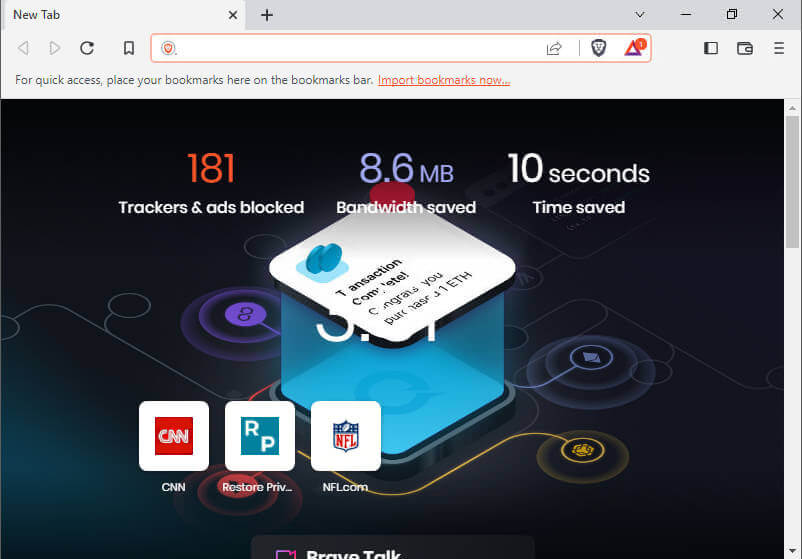
Tor network – Brave also has a feature that allows you to access the Dark web by simply opening a new window with Tor. We discuss this feature in our guide on how to access the Dark web safely.
Ads – Brave has received some criticism for its ads program, which allows users to “view non-invasive ads without compromising your privacy.” While some people find it hypocritical that a privacy-focused browser has its own ad program, we also see it as a secure funding source. And with many browsers financially struggling, it appears that Brave’s business model is securing this browser’s future and ability to continue to innovate its products.
Here are some more results of Brave’s continuing innovation:
- Brave has developed a private search engine called Brave Search, which is now the default search engine when you do a new installation of the Brave browser. In March of 2023, they added the AI-powered Summarizer to Brave Search.
- A cookie consent blocker, which at least partly frees you from the endless hassle of accepting or rejecting cookies at new sites you visit.
- Brave News, an RSS news reader.
- Brave Wallet, a built-in cryptocurrency wallet.
You can read more about Brave’s privacy features here.
https://brave.com
2. Firefox (when modified and tweaked for privacy)

Firefox is a great all-around browser for privacy and security. It offers strong privacy protection features, many customization options, excellent security, and regular updates with an active development team. The newest versions of Firefox are fast and lightweight with many privacy customization options.
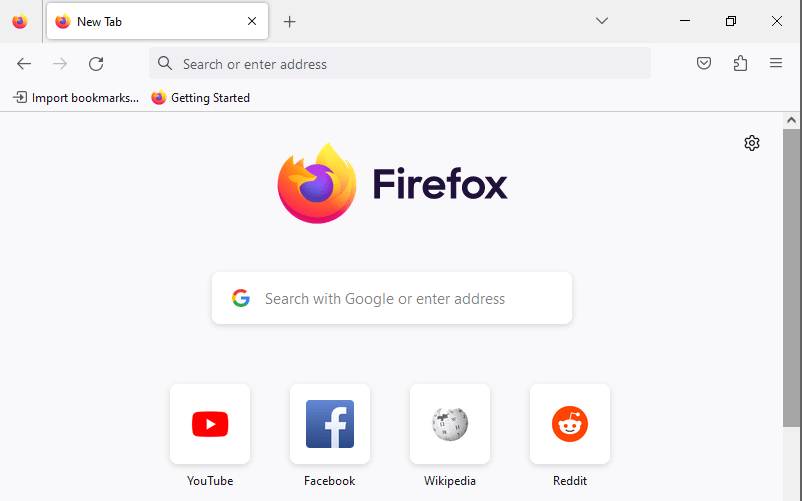
Out of the box, Firefox is not the best for privacy, but it can be customized and hardened, and we show you exactly how in our Firefox privacy modifications guide. Be sure to disable telemetry in Firefox, which is a feature that will collect “technical and interaction data” and also “install and run studies” within your browser.
Within the Privacy & Security settings area, there are many useful customization options for different levels of privacy: Standard, Strict, or Custom.
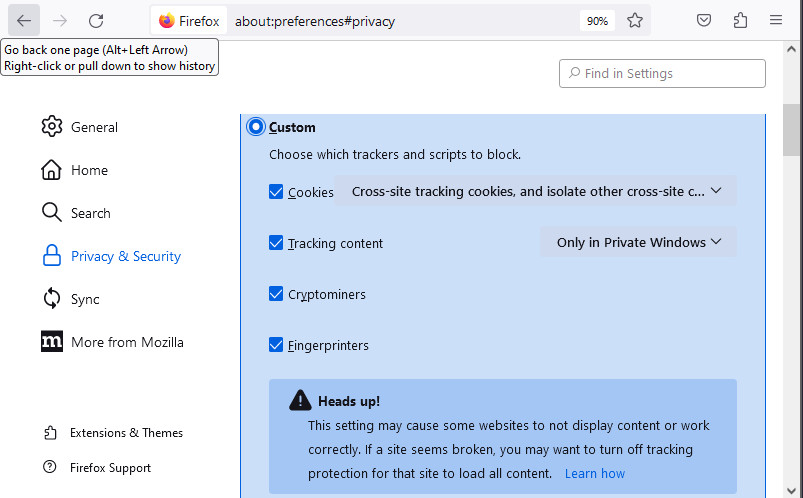
Another great benefit of Firefox is the ability to use numerous browser extensions that can enhance your privacy and security. We’ll go over some of these extensions later in this article.
Firefox highlights:
- Open source code that has been independently audited
- Active development with frequent updates
- Excellent privacy features and customization options
- Total Cookie Protection (TCP) to prevent cookies from tracking you as you move around the web
- Firefox View to easily return to recently used sites
- Built-in ad blocker
- Many browser extensions supported
- Telemetry and tracking need to be manually disabled
- Other modifications necessary for extra privacy and security
If you want to keep using older add-ons that are no longer supported by the latest Firefox release, you can go with the Firefox Extended Support Release (ESR). For those times when you want the maximum privacy viewing content on your Android phone, you could try Firefox Focus.
For additional customization and privacy settings, check out our Firefox privacy guide.
https://www.mozilla.org/firefox
3. Tor browser

Next up we have the Tor browser. The Tor browser is a hardened version of Firefox that is configured to run on the Tor network. By default, the Tor Browser is a secure browser that protects you against browser fingerprinting, but it also has some disadvantages.
Because it uses the Tor network, which routes traffic over three different hops, download speeds with the Tor browser can be quite slow. The default version may also break some sites due to script blocking. Finally, there are drawbacks to the Tor network itself. These include:
- Malicious/dangerous exit nodes
- High latency
- Many websites block IP addresses originating from the Tor network
- Dependence on US government financing, leading some to claim the Tor network to be fundamentally compromised
See the pros and cons of Tor here.
Another option is to use the Tor browser with the Tor network disabled. In this sense, the Tor browser will work like the other secure and private browsers we’ve covered above. Additionally, you can simply run a VPN in the background. Like the Tor network, a VPN will also encrypt your traffic and hide your IP, but it will be much faster.
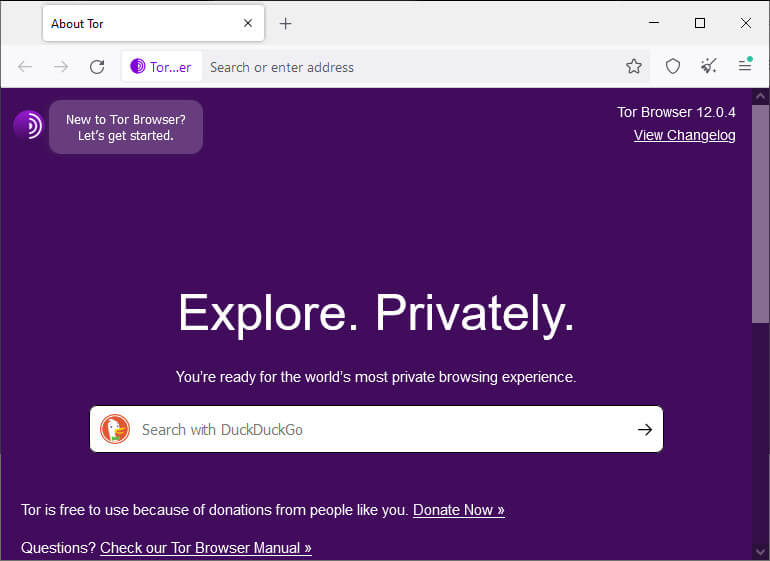
There’s a new browser out there that takes exactly this approach. It is a collaboration between Mullvad and the Tor project, and you can learn more about it in spot #6 on this list.
Be careful when adjusting the settings for the Tor browser, however, as this may compromise the browser’s built-in privacy and security features.
https://www.torproject.org/
4. Ungoogled Chromium browser

Ungoogled Chromium is an open source project to provide a Chromium browser, without the Google privacy issues:
ungoogled-chromium is Google Chromium, sans dependency on Google web services. It also features some tweaks to enhance privacy, control, and transparency (almost all of which require manual activation or enabling).
ungoogled-chromium retains the default Chromium experience as closely as possible. Unlike other Chromium forks that have their own visions of a web browser, ungoogled-chromium is essentially a drop-in replacement for Chromium.
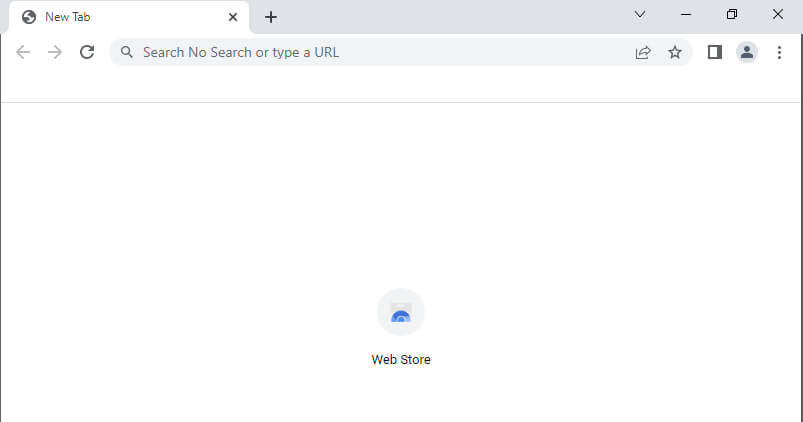
UPDATE: Support for Ungoogled-Chromium has continued, but it has moved from its original github archive to the new archive linked below. It does require some technical skills to download this browser from the archives.
https://github.com/ungoogled-software/ungoogled-chromium
5. LibreWolf – A private and secure fork of Firefox

LibreWolf is a fork of Firefox that continues to grow in popularity. The project’s stated goals are to deliver a browser that is focused on privacy, security, and freedom. From the LibreWolf website:
LibreWolf is designed to increase protection against tracking and fingerprinting techniques, while also including a few security improvements. This is achieved through our privacy and security oriented settings and patches. LibreWolf also aims to remove all the telemetry, data collection and annoyances, as well as disabling anti-freedom features like DRM.
The website lists the main features of LibreWolf as:
- No Telemetry
- Private Search
- uBlock Origin pre-installed
- Enhanced Privacy
- Fast Updates
- Open Source code
LibreWolf is available for desktop operating systems, including Windows, Mac OS, Linux, and Open BSD. You can find installation instructions here.
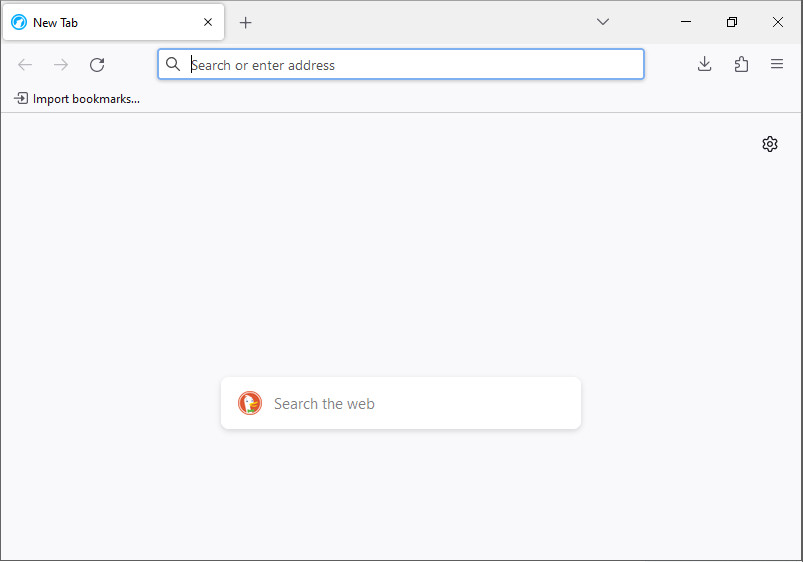
One issue to keep in mind, however, is that there are no automatic updates. This means that you will need to manually update the browser, which is certainly a drawback to consider. Fortunately, LibreWolf frequently pushes these browser updates to the relevant archive managers, making it easier to update than it would otherwise be.
LibreWolf is always based on the latest version of Firefox. Updates usually come within three days from each upstream stable release, at times even the same day. Unless problems arise, we always try to release often and in a timely manner.
– LibreWolf FAQ section
This is definitely a browser to consider for those wanting more privacy and security on desktop operating systems.
https://librewolf.net/
6. Mullvad Browser – A privacy collaboration between Mullvad and Tor

When we talked about the Tor browser earlier in this article, we suggested using the Tor browser with the Tor network disabled and a quality VPN might be a better way to go than using the Tor network. We’re not the only people who feel this way. The Mullvad Browser is designed to do exactly this.
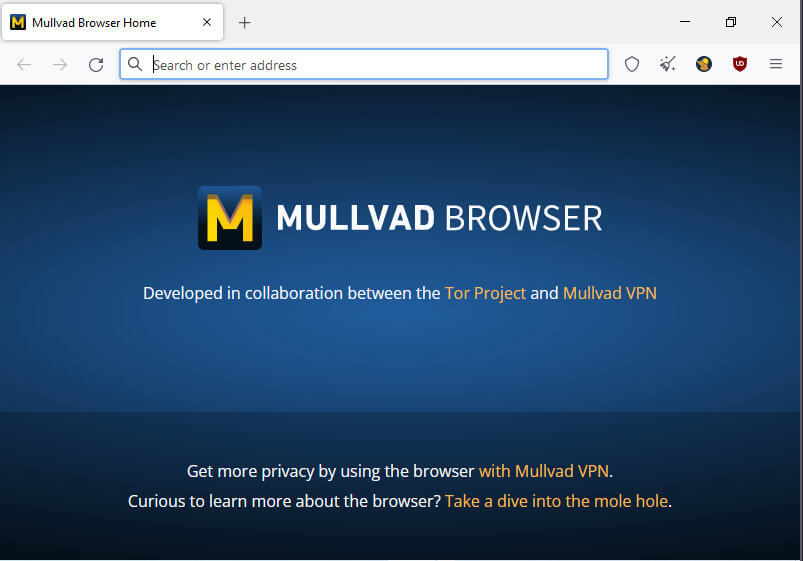
This privacy-focused web browser is a joint project between Mullvad VPN and the Tor Project. It incorporates the privacy benefits of the Tor browser such as tracker blocking and fingerprinting. But the Mullvad Browser isn’t designed to connect to the Tor network.
Instead of going through the Tor network, the Mullvad Browser is meant to be connected to the internet through a quality VPN. Obviously, the folks at Mullvad would love for you to use their browser with their VPN, but you don’t have to. In the image below I am using the Mullvad Browser to view this website through NordVPN.
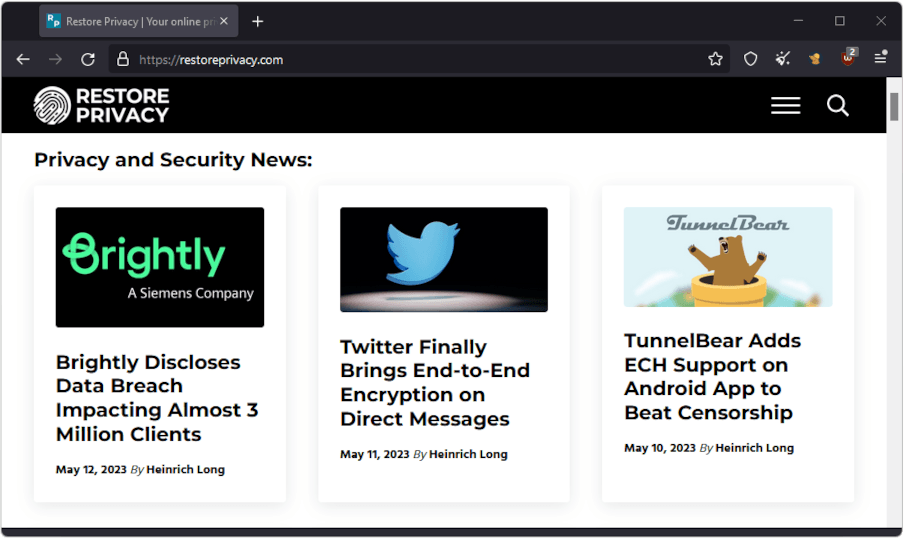
This browser collaboration definitely has potential. To learn more about it, check out our recent article on this Mullvad – Tor project.
https://mullvad.net/en/browser
7. DuckDuckGo private browser (macOS, iOS, and Android)

The DuckDuckGo private browser is available for macOS as well as mobile devices running iOS or Android. It comes with lots of privacy-focused features by default. According to DuckDuckGo, their browser offers:
- Built-in tracking protection
- Encryption upgrades via Smarter Encryption technology
- Easy data management and clearing options
- Fast speeds
Issues with Microsoft trackers
One important thing to be aware of is that security researchers previously discovered that DuckDuckGo’s browser allowed Microsoft trackers. According to DuckDuckGo founder Gabriel Weinberg, this decision was based on a “confidential” agreement between DuckDuckGo and Microsoft.
Many people in the privacy community were outraged when the situation first came to light on Twitter here. There was clearly an element of hypocrisy going on here as we see DuckDuckGo castigate Google over the same practices. But last year, DuckDuckGo announced that they had reached an agreement to block Microsoft trackers.
Should you use DuckDuckGo’s privacy browser? I’d recommend that you consider some of the alternatives we recommend in this guide. That said, the changes DuckDuckGo has made to block the Microsoft trackers makes us much more comfortable with this browser. Ultimately, the choice is yours.
The DuckDuckGo private browser is available on both the Google Play and Apple stores.
8. Waterfox
Waterfox is a fork of Firefox that was maintained by just one person for many years. In February 2020, news broke that the developer of Waterfox sold out to a pay-per-click ad company called System1. However, in July 2023, news broke that Waterfox is once again independent:
I am happy to say that Waterfox is independent again. This change allows the community and myself to shape the browser’s future direction.
Waterfox Blog
Putting all that aside, Waterfox is a great option for those wanting Firefox with out-of-the-box privacy.
Waterfox website >>
Private browsers worth mentioning (but not necessarily recommended)
Here are a few private and secure browsers that didn’t make our recommended list but we think are still worth mentioning.
9. Bromite (Android)
Bromite is a Chromium-based browser for Android only (no desktop support). It comes with some great features by default, including ad blocking and various privacy enhancements.
Unfortunately, being a small project, Bromite suffers from infrequent updates. The last update was apparently in 2020!
Here are some highlights of this browser from the official Bromite website:
- The main goal is to provide a no-clutter browsing experience without privacy-invasive features and with the addition of a fast ad-blocking engine.
- Minimal UI changes are applied to help curbing the idea of “browser as an advertisement platform”.
- All patches are published under GNU/GPL v3 to enable other open source projects’ usage.
- Bromite is only available for Android Lollipop (v5.0, API level 21) and above.
Another cool feature I like with Bromite is that you can use custom ad block filters — learn more here. Bromite is under active development and remains a great browser for Android users.
https://www.bromite.org/
10. Pale Moon
Pale Moon is another open-source fork of Firefox, which aims for efficiency and customization. In testing out Pale Moon, it does offer different customization options, as well as support for older Firefox add-ons and its own lineup of add-ons. The design feels a bit dated, but it’s also not overly-cluttered and is lightweight and fast. Even more importantly, this secure browser is still being updated
Pale Moon is currently available on Windows and Linux, with other operating systems in development. Unlike other Firefox forks, Pale Moon runs on its own browser engine, Goanna, which is a fork of Gecko (used by Firefox). This is an older engine that was previously used by Firefox, but has long since been replaced. Many argue that this older codebase is a security vulnerability. And it’s also worth noting that the development team is very small compared to more popular browsers.
Pale Moon website >>
11. GNU IceCat
GNU IceCat is a fork of Firefox from the GNU free software project. IceCat is entirely “free software” as defined here and also includes various privacy add-ons and tweaks by default. Here are the privacy-protection features listed on the IceCat page:
- LibreJS
- HTTPS-Everywhere
- SpyBlock
- AboutIceCat
- Fingerprinting countermeasures
No updates – The big issue with GNU IceCat is that there do not appear to have been any updates since 2019. This can expose IceCat users to security vulnerabilities, which is why we are no longer recommending it.
GNU IceCat website >>
12. Iridium
Like Brave, Iridium is a secure browser that is based on Chromium and configured for more privacy by default. The following excerpt from Iridium’s website provides a good overview of this secure browser:
Iridium Browser is based on the Chromium code base. All modifications enhance the privacy of the user and make sure that the latest and best secure technologies are used. Automatic transmission of partial queries, keywords and metrics to central services is prevented and only occurs with the approval of the user. In addition, all our builds are reproducible and modifications are auditable, setting the project ahead of other secure browser providers.
Iridium is still being updated pretty frequently. However, it is not a widely-used browser, and there is no support for Android, iOS, or any other mobile devices.
Iridium browser website >>
Issues with other popular browsers
While some browsers claim to be secure against vulnerabilities, they might not be the best choice from a privacy perspective.
1. Google Chrome
Google Chrome is by far the most popular browser. Unfortunately, it’s a data collection tool as well and not a good choice for anyone looking for privacy.
You can safely assume that everything you do through Google Chrome is collected, saved to your data profile, and used for targeted advertising.
2. Microsoft Internet Explorer/Edge
Edge is a Microsoft product.
Just like with Windows, it’s a good idea to avoid Microsoft products, including the discontinued Internet Explorer and its replacement, called Edge. Both those browsers are closed-source, so there’s no telling what’s going on behind the scenes, and they’re also not the best for privacy reasons.
3. Opera browser
Opera started off as a decent browser, developed in Norway. However, in 2016 it was sold to a Chinese consortium for $600 million – and a lot has changed. The following information from Opera’s privacy policy explained how user data was collected and shared when you used Opera products. This was enough to turn us off to this browser:
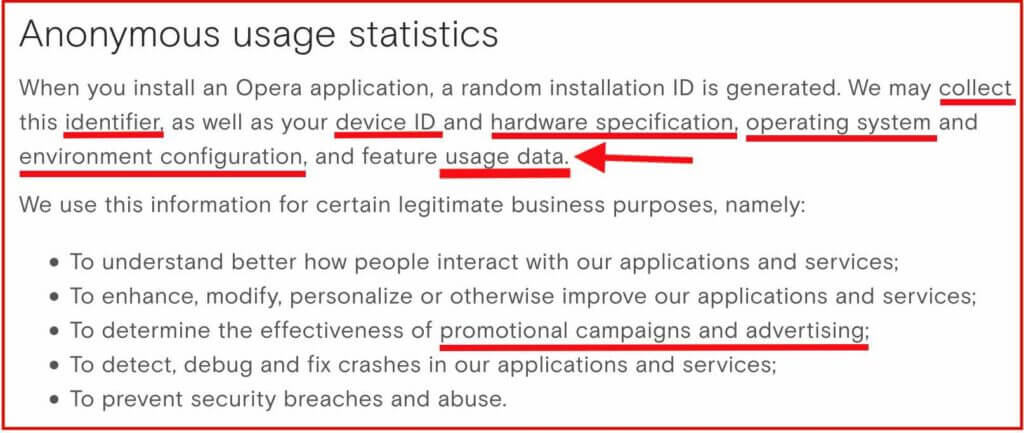
Opera also claims to offer a free VPN through the browser. However, as we covered in the Opera VPN review, it’s not really a VPN and does not offer full system-wide encryption. Additionally, your data is being collected when you use Opera browser and its “free VPN” feature.
4. Epic browser
Epic is a browser based on Chromium, created by “Hidden Reflex” which is based in India. Since 2014, Epic has been claiming they would open source the code, but it remains closed source today. What’s going on behind the scenes? How do they manage Chromium and remove invasive code? Who knows.
Just like with Opera VPN, Epic falsely claims to offer a “free VPN” through the browser, but this is not really true. The browser is merely routing traffic through a US proxy server. As we learned with Opera (and with many other “free proxy” services), proxies are often used for data collection (and they are often not secure). When reading the Epic privacy policy, we find that data from “video download and proxy services” is being collected.
One person who analyzed Epic found it to be connecting to Google on startup. This suggests that Epic is not, in fact, de-googled as it claims.
There are many better Chromium-based browsers to consider.
5. Safari browser
Safari is the default browser for macOS and iOS devices. Overall, Safari is not a horrible choice in terms of privacy and tracking protection – but it also cannot be recommended for a few reasons:
- Apple is a partner in the PRISM surveillance program
- Apple was caught “hoarding” Safari browsing history – even after it was deleted
- Apple was found to be collecting Safari history even when used in private mode
On a positive note, however, Apple does somewhat better with privacy than other large companies. The Safari browser blocks third-party cookies by default and also implements cross-site tracking protection.
6. Vivaldi browser
Vivaldi is a Chromium-based browser with source-code modifications that can be seen here. It is less popular than other browsers, with less active development than Firefox, for example.
Reading through their Privacy Policy, I did find some concerning information about data collection and the use of unique IDs:
When you install Vivaldi browser (“Vivaldi”), each installation profile is assigned a unique user ID that is stored on your computer. Vivaldi will send a message using HTTPS directly to our servers located in Iceland every 24 hours containing this ID, version, cpu architecture, screen resolution and time since last message. We anonymize the IP address of Vivaldi users by removing the last octet of the IP address from your Vivaldi client then we store the resolved approximate location after using a local geoip lookup. The purpose of this collection is to determine the total number of active users and their geographical distribution.
You can read more about Vivaldi here.
Secure and private browsers on mobile devices
Many of the recommended browsers above also offer versions for mobile users on iOS and Android.
With that being said, here are some good options for mobile users:
- Brave
- Bromite
- Firefox Focus
- DuckDuckGo
I also like using standard Firefox on mobile devices with customization and configurations for more privacy.
Browser privacy and compartmentalization
One problem that often comes with browser privacy and security is that people want to remain logged in to various accounts, while also browsing the web. But this is problematic. When you stay logged in to Gmail or Facebook, for example, their trackers can record your activity as you browse the web.
One potential solution to this problem is browser compartmentalization. This is when you use different web browsers for different online activities. For example:
- Browser #1 will only be used for accessing your online accounts that require a password. You can stay logged in with only this browser, and it won’t be used for general browsing.
- Browser #2 will only be used for web browsing, with various privacy configurations and no cookies or history being stored on the browser.
- Browser #3 could be completely locked down for maximum privacy and security.
You can also utilize different browsers, configured exactly the way you want, for various purposes, depending on your needs and threat model. The key is to keep the compartmentalization strict and not break the rules/uses for each browser.
Virtual machines – On the topic of compartmentalization, using virtual machines is also a good idea for both privacy and security. You can easily run Linux VMs through VirtualBox (FOSS) on your host computer.
Password managers – It should also be noted that storing your passwords in the browser may be risky depending on the browser you are using, especially since browsers may store passwords in cleartext. A better alternative would be to utilize a secure password manager. We have reviewed many popular options, including Bitwarden, Dashlane, LastPass, and more.
Browser add-ons for security and privacy
In addition to adjusting the settings within your browser, there are also a number of different add-ons or extensions you can install to improve your browser’s privacy and security.
Here are a few different options, but they may not all be supported by the browser you are using:
- uBlock Origin – This is one of the best browser-based ad blockers available that will also protect you against tracking.
- Cookie Autodelete – This will automatically delete cookies that are no longer needed from your browser.
- NoScript – NoScript allows you to customize exactly which scripts run on the websites you visit. Like uMatrix, this is for advanced users and requires lots of customization.
Warning: Be cautious about using third-party add-ons and browser extensions. There are many Chrome VPN extensions that are 100% free, but also very dangerous. Do your research first, since add-ons and extensions could function as spyware and data collection tools for third parties. This is especially true with free VPN services or browser proxy add-ons from questionable sources.
“Private” or “Incognito” browsing mode is NOT private (and why you need a VPN)
Many people falsely assume that using “private” or “incognito” mode in a browser actually provides some privacy. This is a false assumption.
Using “private” browsing mode only stops your browser from storing cookies, history, and passwords. But it doesn’t actually make you any more “private” to the outside world. Even when browsing in “private” or “incognito” mode, you are still exposed:
- Your internet provider can still see every site you visit. And note that internet providers are now forced to log web browsing activity of their customers and provide this data to authorities on request in many countries. In the United States, ISPs log everything and share the data with a huge network of third parties.
- Your real IP address and location remain exposed to all sites, ads, and trackers. This makes tracking and identification easy since your device has a unique IP address linked back to your identity through your internet service provider.
To easily solve these problems, we strongly recommend using a good VPN service. Using a VPN is simple. You just need to sign up for a VPN subscription, download the VPN app for your device, then connect to a VPN server and browse the web as normal. This offers many benefits:
- A VPN will securely encrypt your internet traffic, which prevents your ISP from seeing what you do online. (Your ISP will only see encrypted data, but not what you’re actually up to.)
- When you connect to a VPN server, the VPN server’s IP address and location will replace your real IP address and location. This allows you to appear to be anywhere in the world.
- A VPN will also allow you to access geo-restricted content, such as streaming Netflix with a VPN from anywhere in the world.

Below is a brief overview of our recommended VPNs. They have each come out on top in our testing for the respective VPN reviews.
- NordVPN: A fast, secure, audited VPN with advanced privacy features and a strict no-logs policy, based in Panama (with a 74% off coupon). See our NordVPN review here.
- Surfshark VPN: A no-logs VPN service with a large lineup of privacy and security features, based in The Netherlands. See the Surfshark VPN review.
- ExpressVPN – A fast, reliable, and secure VPN that also works well for streaming, but with above-average prices. See the ExpressVPN review for the pros and cons.
Short on money? There are also some good cheap VPNs that offer excellent features and performance, without breaking the bank. We also have detailed VPN comparisons. Our ExpressVPN vs NordVPN guide compares the top two providers.
Conclusion: Secure browsers and privacy in 2024
A well-configured secure browser is crucial for protecting your data if you want to browse the web with kind of privacy. But there are several good, secure browsers to choose from. So how do you do it?
Finding the best secure browser for you comes down to identifying the one that best fits your unique needs. Since this is a personal decision with subjective criteria, we can’t recommend a single option that is best for all use cases.
In truth, you need more than a secure browser that is configured to protect your privacy. To that browser you should add a quality VPN that will encrypt your traffic and hide your IP address.
You should also consider using a good ad blocker. Many ads include tracking code that companies can use to collect your browsing data and serve you targeted ads. If you aren’t blocking ads, your activities can be tracked by third-party advertising networks, which is not at all ideal.
Note: There are some VPNs that have built-in features to block ads and trackers. See our guide on VPN ad blocking for more info.
In terms of privacy, you may also want to protect yourself against browser or device fingerprinting and WebRTC browser leaks, which can expose your identity even when using a good VPN service.
This secure browser guide was last updated on May 15, 2024.

You should consider evaluating Librewolf as another alternative browser with exceptional privacy and anti-fingerprintng. Its performance ranks superior in privacytest.org test of internet browsers.
A. P. Schmatz
Yep, will do, thanks.
Unfortunately, the overall online environment is a lot more hostile to privacy than many people realize.
https://www.wired.com/story/leaky-forms-keyloggers-meta-tiktok-pixel-study/
@Mike. Great link! Very interesting
Just use Firefox beta, you can do the about:config on andriod. Use a vpn if you must, and you are set.
From a privacy and security perspective, what are the pros and cons of using multiple browsers for accessing different content that requires a user id? To what degree would this actually hamper connecting data from different web sites by known data brokers?
Also, what are the pros and cons of using separate software that is created for the sole purpose of accessing a certain web site instead of a browser?
Just to clarify, I am just asking for more clarification on the effectiveness of browser compartmentalization
Also for those stuck using android devices, is there a way to make sure stored data from webview is cleared automatically in order to ensure that there is less data left behind by apps requiring its use?
Hi Stephen,
You have very good questions.
Have you read the Restore Privacy browser finger-printing guide?
I think you will find a lot of useful information there that addresses your inquiry.
InfoSec is a broad subject, a browser is just one tool in a bigger situation.
Yes using multiple browsers makes it harder for you to be tracked but this is only useful within a broader InfoSec posture. As an example, if someone is using multiple browsers and logs into Facebook on each browser they certainly could correlate the activity across both browsers.
Brave’s anti-fingerprinting tech and FF too is no defence. I have tested it with tools (listed in the comments of the mentioned article.) I have also tested it against a Australian Govt organisation (legally) Despite all my defences they blocked my browsers until, I switched off JS, or used a new browser, or (strangely) switched my IP to an international location (Why they use IP, I don’t know.) Browsers are no defence against sophisticated organisations.
(I sent them a complaint and with in days they switched back to using cookies to track users. I emphasise – nothing illegal on my part . And it was a silly miss-use by them because they hit an ant with an elephant and showed what they’ve got.)
It is hard to measure a browsers defence against ad-companies tracking tech because the sophistication of their tech is not public. However, the listed organisation above couldn’t correlate separate browser activity. So browser compartmentalisation is useful, but it is only as good as one’s OpSec. It’s the tools and the human.
UBlock Origin is a great tool. A good tutorial can be found here:
https://www.youtube.com/watch?v=2lisQQmWQkY
(note: I don’t personally agree with some opinions expressed on the channel but as a tutorial it’s good)
If your interested in browser segmentation customised UBlock Origin is you best mate.
(Standard UBlock Origin is a good option too)
I use Android too, myself, I don’t hope for privacy on Android.
G.L.
BoBeX
Just a note for those who need to use Android and prefer Firefox:
Mozilla disabled access to about:config in Firefox but there are some Firefox forks that still allow access to about:config, one choice that is not too outdated would be Fennec from the F-Droid repository
That being said, going with the recommendations of people who are knowledgeable enough to write these articles is usually the better choice
Out of curiosity, I used a program called trackerControl to check these browsers for known connections to well known web sites and repeatedly checked the results, here is what Brave connected to when I simply did one search on duckduckgo and did not click on any results:
Amazon owned web addresses (attempts to connect every few minutes):
d17ndjuagurpsr.cloudfront.net
dwtadpmb3tnys.cloudfront.net
Google owned web addresses (Attempt to contact only once):
safebrowwsing.googleapis.com
http://www.googleapis.com
By comparison, Firefox only attempts to contact safebrowsing.googleapis.com when I perform the same web search
When checking this, I did not have Google Play Services or MicroG installed
Should I deliberately block access to the cloudfront servers? What reasonss does Brave have for contacting them?
Very interesting….I bet you Brave is not as private as they claim to be. I used to be a big Firefox user for a longtime until they started screwing up there browser and there privacy. There are no decent browser anymore, they more or less all suck. I have been trying out Ghostery and the bulls**t with the constant dark mode is a freaking joke, plus it is not as quick as I thought it would be. There are no decent Firefox forks anymore that are truly worth using unless someone can show that I am wrong?
Hi Stephen,
You are clearly a good privacy thinker.
Does “trackerControl” provide any useful info that (on Windows) the “netstat” command doesn’t?
Regards,
BoBeX
Anyways, any good privacy friendly browser for ios? Other than brave and duckduckgo, which block adsand doesnt collect data.
SnowHaze or Privacy + on iOS. From my experience, SnowHaze is the best privacy browser overall.
I dont see a privacy plus but i see snowhaze tho.
Safari is a lot better than this article claims: browser history is end-to-end encrypted between your devices, so it is completely irrelevant that it retains deleted history entries for syncing. And the PRISM accusation has never been accompanied by any actual evidence, not even after all this time, and also extends to basically every other major tech company.
On both macOS and iOS, I recommend using Safari as a primary browser and Tor Browser as a secondary (having two browser engines around also helps if you’re debugging something). In the case of iOS, the Tor Project recommends (but does not develop) an app called Onion Browser: https://support.torproject.org/tormobile/
Onion Browser is basically Tor Browser but with WebKit.
Whats the difference between webkit and not webkit, well for privacy?
I’ve been using the Epic Browser since I was in high school. I was at a stage in live where I started to understand more about technology and I found out that it was probably for the better to avoid browsers from big tech companies (Chrome, IE, Safari, etc.). It seemed like a really good browser at the time especially with its build-in ad blockers and VPN. It have been my main browser ever since and never really doubted it until I came across this article. I never really looked back on the privacy topic but I guess now it the time to switch to one of the other mentioned browsers. I’d like to have a similar experience so I guess I’m going with either Brave or Ungoogled Chromium browser.
Any tips and things I should take into account?
I suggest you use Brave. The difference is that with UnGoogled Chromium users have to manually update the browser and extensions they place on it. This as opposed to Brave where you don’t. If you can handle manually updating a browser, then have at it. Otherwise, Brave is the best Chromium-based browser for privacy and security.
Good luck!
Use firefox beta, it can do the about:config even in andriod.
Or use kiwi browser, you can add/use the google chrome extensions, besides its open source
Dont use epic , it connects to google at startup, maybe its the auto search engine pre load, but still it connects.
What is the best privacy browser for an older android phone (Brave?) ? Will a privacy browser do any good because of the fact that most Android phone come with Chrome as the default browser.. Also, I believe that Chrome cannot be permanently removed only “force stop” or if possible “disabled”, where as on a laptop you can add/remove it without it causing any issues.
You can disable, but not delete Chrome on Android. However, I suggest you try browsers and see which one works best for you. The two I like Chrome-based browsers I like for Android phones are Brave and Bromite. If you’d prefer a non-Chromium browser then I suggest you try Firefox.
Hope this helps and Good luck!
Is there a decent browser out there that does not have it own built in ad blocker? First, the ad blockers in the Brave browser sucks and there is no way to remove it…second Ghostery blocker is worthless and not the browser it self is not that impressive. The only decent ad blocker is uBlock Orgin and I am no computer expert but it looks like Ungoogled Chromium is the only somewhat new browser that I can use uBlock Orgin and there is no auto update option in it (stupid design). Unless I go back to 1 of these old crappy browser like Pale Moon or Firefox, I’m out of luck. These new browser developers are idiots, why can’t anyone design a decent browser that covers all the requirements.
You can use Mozilla’s add-ons with Ghostery and with Brave you can use Google Chrome’s extensions. Otherwise, a lot of browsers come with ad-blockers built in.
Hi – I saw that Yubikey has integration with a browser called Maiar, which Yubico lists as a “privacy-first browser” on their catalog webpage. But I don’t think you listed it here – is there something missing/lacking with Maiar?
I guess it was last year (maybe year before last) that I learned about Maiar and UR, Chrome/Chromium variants. I wrote each an email asking a few questions. UR responded; Maiar did not. Anybody who ignores me, I ignore them. So I now use UR as a backup browser when my Firefox variants won’t deal with a website properly. Since I don’t use it a lot, I can’t say much about it, but I trust that it’s doing what it’s supposed to do without the Google spying. But since UR and Maiar are gaining no discernable traction in the browser market, I think it’s safe to say that one day they will disappear.
interesting – appreciate the insight from your end vanp!
Neither Brave or the modified secure Firefox prevents YouTube and some extension cookies from being saved in your browser. Only TorBrowser does being an extremely advanced modified version of Firefox.
I see no section on operating systems, so here goes: any thoughts on Zorin (from Ireland) for privacy?
@Zillionleaf there are recommended operating systems at the “Google alternatives” section of this website.
Novice user here, just got rid of Pale Moon a few month ago because I got tired of it “always freezing up” when I go to YouTube, Facebook, etc. So now I have been using Ghostery Dawn and Brave browsers and the results are mixed. Not a fan of Chromium based browsers and I had high hopes for Ghostery but was not impressed at all. Ghostery is more or less always in dark mode and the web pages load like there is never enough memory? Don’t know if Ghostery is a memory hog or what but for now I am using Brave (blah) which runs smooth until I can find a solid Firefox fork browser. Maybe I will try Ungoogled Chromium regardless of the lack of auto updates. These new webpage developers are doing a crap job of making decent new browsers and thats just sad.
That is unfortunate and I do agree that dark mode is a pain in the neck with Ghostery Dawn. However, Ghostery’s website has an FAQ that might answer your questions of address your concerns or you could reach out to them for assistance. I would give that a shot before dumping the browser.
In terms of memory usage I really have not had a problem and Ghostery Dawn works like a charm for me. Perhaps there might be some settings on your computer you could change? If not, the remedies that usually work for me when a browser slows down is to close and then re-open it or just reboot my computer. Hope this helps and good luck!
https://www.ghostery.com
anyone heard of http://www.talon-sec.com ?
No. Is it any good? Is it open source? Please explain if you like it or not and why?
While there are ways you can avoid this identifier, but Mozilla are such hypocrites.
https://www.ghacks.net/2022/03/17/each-firefox-download-has-a-unique-identifier/
“Nightly Chrome canary builds can now track user interests and run ad auctions.”
https://arstechnica.com/gadgets/2022/03/googles-topics-advertising-system-starts-rolling-out-to-chrome-canary/
Being a complete novice, my eyes are wide open. What I’ve seen when setting up passwords are 2 disturbing things.
1. While setting up an account at I guess would be considered a web retailor, I typed in a password, hit continue, and was emediatly prompted “Your password can’t be the same as your sign on name”. So much for encryption!
2. After joining a site, you get a welcome / thanks for joining email. Contained within, they sent my unencrypted password.
How is this not only known, but why isn’t there action against cyber thieves? If I slip up, I’m instantaneously put under a microscope.
Wait it gets better. “crypto” currency. This is where the real theft will get everyone.
this is total exploitation. Where’s regulation?
The worlds gone to shit
Running xbox, ms edge did update & removed up / download capabilities.
I wonder just how afraid is goliath of David?
DO NOT depend on regulation by Governments for privacy– Govt’s(all of them, as shown by all of history & proven with simple logic) are by definition inherently inefficient, wasteful, & coercive territorial monopolists of ultimate decisionmaking and violence…the courts are part of Government and are part of the problem…there is literally no objective 3rd party to go to for help…that is why we need Decentralization & neutrality…Governments need to be forced to compete to attract financial & human capital…clearly, big Govt equals big problems…force governments’ to compete to keep them in check and friendly to liberty (aka the absence of coercion)…Government will not protect your privacy..they will invade it with unlimited resources if Govt is allowed to become huge, like in the USA & elsewhere…we need decentralization & neutrality & a large # of small governments that have to compete with each other… DO NOT depend on Gov’t for privacy!
I have been using Ghostery Dawn and it is a solid browser the only downside is the “Dark Theme” background crap. Why there is no normal mode or light theme is ridiculous, not everyone wants the dark theme mode.
I suggest you contact Ghostery and tell them what you think. I tend to agree with you. I believe the browser is always on private mode and I think we should have the choice whether of what browser mode we want to use. Otherwise, I agree that, aside from its drawbacks, Ghostery Dawn is a very good browser.
https://www.ghostery.com/
Because of my weak eyesight I am looking for an alternative to Ghostery Dawn, the dark mode is horrible…which is a shame. I would really like to use Ungoogled Chromium but with no auto update option, I will pass. It really baffles me why these browser developers leave out such important features ie: auto update, light mode, etc., it has to be the stupidest thing ever and makes no sense.
@Rick if that is the case, then I suggest you use Brave. I use it in addition to Ghostery Dawn and it is very good. It is similar to UnGoogled Chromium with all of the spyware built in to Google Chrome stripped out, has very good privacy and security features and, best of all, it can be set to auto update.
Good luck!
Is there any tweaking to make Ghostery Dawn a little faster? I am kind of disappointed with it, I do not like the constant dark theme and it seems to be a little slower the Brave. I have been using both and Brave seems to be faster but I am not a fan of Chromium browsers. Any suggestions would be greatly appreciated.
@Nick since Ghostery Dawn is a Firefox fork, if you haven’t already done so, you could try to modify the browser using the suggested tweaks for Firefox linked above to see if that would work. If you have a lot of extensions, perhaps remove some to only those necessary to “lighten the load”.
It is unfortunate that your browser slows down as I have been using it next to Brave and, in my experience, Ghostery Dawn is just as fast. One other thing I do if I notice a browser is slowing that usually works for me is to close it out and re-open it. Rebooting your computer might work too.
The new browser, expected soon. They promise a lot:
[https://www.island.io/]
Is it open source?
I don’t know much. It’s a work in progress, as far as I know. More will be announced in coming weeks.
My setup :
Bromite for Accounts
Firefox for downloads
Duckduckgo for disposable searches
Tor for anonymity
For those of you who’d like to sync your desktop browser with your mobile ones but don’t like the idea of having to register (like you have to with Firefox, Vivaldi or even Chrome), I have found a solution.
XBrowserSync is a free and open source browser synchronization client where users don’t have to sign up nor is your data ever collected. Just download the apps to your Android mobile device(s) and computer, enter a password for XBrowserSync’s encryption and you are good to go!
https://www.xbrowsersync.org/
This service is similar to Brave’s sync feature (which is very good). Unfortunately, XBrowserSync is not available for iOS.
Have a look at Min, a very nice minimalist, privacy-focused browser: https://minbrowser.org/
I wouldn’t give Brave the top spot, considering the Binance affiliate link scandal and the problematic Brave Rewards platform.
Librewolf does not automatically check for updates, because this is a potential privacy issue. However, there is the Librewolf update checker addon that someone referred to above, and it can be set to check every hour, or every time you launch the browser. The addon is not from the Librewolf team itself, but they do mention it positively on their site. Then in the addon you can download the update. I don’t think it is complex.
I am running Librewolf in portable config, and, so far so good.
There have been some sites that do not work, but it has been quite limited. There are also some sites that do not work in FF.
The problem with the update checker is that it only warns a user about browser updates. Firefox and other forks (like Ghostery Dawn) allow users to opt-out of automatic updates but they will be notified. I fail to understand why LibreWolf lacks this feature with regards to updates knowing that users can opt to not have the browser updated automatically.
There is one vital point that needs to be made that doesn’t get addressed here and on other privacy sites. You can take as many precautions (like use a privacy browser) as you want, but in order to achieve full online privacy the server-side needs to be addressed. That is a very bad problem.
Your ISP is probably logging all of your activity and no doubt a letter requesting it from the FBI or police would be quickly given to them by your internet provider or even sold to advertising companies. You know all of those computerized vehicles coming out with those neat gadgets? Well, no doubt they’re monitoring and even benefiting from your personal information too.
So, congratulations on following the advice on websites like this. But know that, until you can have the ability to opt-out of the surveillance mentioned above, just try to keep a low profile and pull out of as many services that benefit from your data as you can.
I recently downloaded Avast Secure Browser.
What is your opinion about it?
I use Ecosia as my search provider.
Thanks for an excellent site. =)
Avast has been caught using their products to mine people’s data. I would suggest dumping it for a better one like one of the ones recommended above.
https://betanews.com/2020/01/30/avast-apologises-for-selling-data/
In case anyone is looking for an alternative to the DuckDuckGo or Mozilla’s Firefox Focus browsers, I downloaded Privacy Browser from F-Droid and it is performing really well. I believe it is also available on Google’s Play Store too.
https://www.stoutner.com/privacy-browser-1-10/
I would agree the only unfornate part is that when enabling java script it leaks webRTC which could expose your ip adress even if you are using a vpn. It is a good browser overall if you keep java script off if you dont want your ip leaked. Another alternitive could be mull from f-droid which is firefox with most of the bad stuff removed. With this browser you can disable webRTC through about:config changes. Hope this helps.
Thanks! Privacy Browser turned to be too cumbersome for my needs. I’m now using FOSS browser and (so far) its pretty good.
https://github.com/scoute-dich/browser/
I have been kind of testing the Brave Browser for the last 6 months and by no means am I a computer engineer. If I were to grade this it would be a C- at best. The downfall of Brave Browser is its Shields…is there anyway to permanently disable it or even better remove it without having to go through the steps mentioned previously in another post. And instead use uBlock Origin.
“Settings > Brave Shield Defaults > Set “Allow Ads and Tracking” “Allow All cookies” and “Allow fingerprinting” and that should result in the same as not having the shields running”.
@David No idea. Brave does have a community forum you can participate in and I am sure ask questions like this. If you do, could you post a follow-up message and let us all know?
https://community.brave.com
Is there a browser you consider to be an A+ or pretty close?
Saw this on the Firefox Browser Add-On page, what do you think?
https://addons.mozilla.org/en-US/firefox/addon/librewolf-updater/
@Chad very interesting! If you or someone reading this use LibreWolf and has this extension or decides to give it a try, please post or reply how well this add-on works.
It works an is recomeded by the offical libirwolf website. I prefer lebirwolf over most other browsers. Plus it has ublock origen preinstslled!
@amonmous I checked and this add-on only alerts a LibreWolf user of an update. It is not set up to update the browser nor any extensions or add-ons placed on it. If a person neglects to update the browser that can be a threat to someone’s privacy and security.
This being the case I still recommend Ghostery Dawn (links below) over LibreWolf like I suggest Brave over UnGoogled Chromium for the same reasons.
1) Windows: https://get.ghosterybrowser.com/download/win
2) Mac: https://get.ghosterybrowser.com/download/mac
3) Linux: https://get.ghosterybrowser.com/download/linux
And now Firefox is joining in the censorship brigade. But this is not surprising at all coming from a company that cares far more about signalling virtue than producing a good browser.
https://www.bleepingcomputer.com/news/software/mozilla-firefox-removes-russian-search-providers-over-misinformation-concerns/
By the way, Yandex is probably the least censored search engine if you want to actually find what you are looking for. That’s what this guy found out:
https://michaelsuede.substack.com/p/search-engine-censorship-test-results?s=r
I do not like this and was able to successfully pull up Yandex on Firefox Focus on my Android phone. Mozilla may have removed a Yandex add-on but I will try to put Yandex on my Firefox desktop browser later. None the less, in light of this, it may be bye bye Firefox for me.
Ironically enough, I am writing this while eating a delicious plate of Beef Stronganoff for lunch. Now all I need is a glass of good Russian Vodka and I am all set. 😉
I successfully added Yandex to my Firefox desktop, the Yandex add-on is still available on the Firefox Add-On repository, and, so far, no issues. Unless I am missing something, I do not understand what Mozilla blocked since everything seems to be normal.
I read must not have comprehended this paragraph in the article:
“In a statement to BleepingComputer, Mozilla says they removed the search providers from users in Russia, Belarus, Kazakhstan, and Turkey for the “prevalence of state sponsored content.””
Great way for Mozilla to shoot themselves in the foot. That really is disgusting that Mozilla would make a decision like that, essentially, imposing their values on users overseas.
I guess Mozilla doesn’t care that Firefox’s market share has shrank so much. Perhaps next Mozilla should remove Google from Firefox or maybe Russia should ban Firefox. Oh well. Bye bye Firefox! It’s been fun!
Did you try metager.de?
@Helmuth I only know of Metager as a search engine. Do they have a browser too?
I don’t like ‘unfriendly’ apps. Just tried to install the Brave browser – it gave me no option to install on a drive other than default OS drive. I like to keep the OS drive (a SSD ) as clean as possible. I don’t like apps that decide on their own with no options.
Their installation routines in general are a bit unusual – a white box with blue accelerator bar and text stating ‘Connecting to The Internet’. Meanwhile, in the background, modifications to the OS drive and other directories are occurring.
I am on my third install attempt after getting notices to open my firewall for “BraveUpdate.exe’. I can see there are three process still running – one for Setup and two for Update, but nothing is actually happening as far as I can tell. These processes have been running for about 15 minutes now.
Perhaps it’s a nice, secure browser. Not sure I’m going to find out.
Nope. Nada. Not ready for prime time from my POV.
Three times I tried to install, even though I don’t like the fact I can’t direct where it installs on my system. Each time the “Connecting to the Internet” message box…no real status of install.
I went to the Brave Help Center/Contact us page…did a few searches. The best I came up with was this link –
https://support.brave.com/hc/en-us/articles/360042816611-Why-isn-t-Brave-updating-automatically-on-Windows-
Said link interestingly mentions both x64 and x32 bit OS (I run 64bit W7). And a Registry change. Nothing I could find on the Brave install…or being able to specify 32bit r 64 bit install.
I have my system secured as I like it. Sorry Brave, I’m not changing my setup for your arcane install routine which really makes me question what else is going on under the covers.
I’m done with this until there is a more standard install and a better support mechanism in place.
If I want to install e.g. brave on my phone, tablet etc., I need to download it from google play – and I need a gmail for this. I don’t understand that when google is this thing I need to avoid, I need to use a google app in order to install and update? How does this work? Can I use other app stores. F droid or is this no go.
You can probably sideload Brave and other Google apps using Aurora Store which is found on F-Droid.
So, @BoBec replied to my question the other day concerning how Beacons work, in that they can’t be prevented from being installed on your browser, but they can be prevented from “phoning home.” (Thanks again, BoBec!)
To follow up on this, and considering that on an iPhone you don’t have the flexibility to use containers, would it be a good strategy to just install a crappy browser like Vivaldi (something I would normally never use), and just use that for YouTube, Google Streetview, and all those platforms and sites that track your every move?
I have not used iOS in a long time but I will take a stab at this. Perhaps use Snow Haze for the platforms and sites you have concerns about and use Safari for regular surfing like business-related activities. Snow Haze is a privacy-focused browser that comes with features that block a variety of ad and social trackers.
Using more than one browser for different uses is a good idea, as I use 2 different browsers on my Android devices for different purposes. Otherwise, I am not sure. Hopefully an iOS or Apple user can weigh in. Good luck!
https://snowhaze.com/en/index.html
I have to say I am very frustrated and have had quite enough. Up until now, I have been a regular user of Bromite for my Android devices. I like the simplicity of the browser along with the strong privacy protections it has too. I only have to change 2 or 3 settings on it to use it, and it’s interface is clean just like Google Chrome. I like using a Chrome-based browser on my Android devices because there are certain things I do that I find Chromium browsers are more suited for the tasks I conduct.
Unfortunately, about a week ago, the browser was updated and it crashes upon trying to open it. I have had things happen a few times in the past after updates were done where Bromite’s ad-blocker was inoperable. During those instances, I would take the time to post on the browser’s Git-Hub page alerting the crew behind Bromite of what happen and would use the previous version of Bromite until the problems were fixed which would take about a week.
But, for me, this latest issue is the last straw and am now using Brave. It has been a while since I used Brave mobile and am very pleased with it so far. This goes back to what I have said before about well meaning idealists that construct projects (like browsers) only to either later neglect them due to changes in their life or they do not adequately test their product or update(s) before releasing them. In this case, it is clearly the latter.
The people behind Bromite really need to get their act together. Problems like this rarely occur with browsers like Firefox and Brave. Both of them have large entities behind them with the necessary people, money, and infrastructure to prevent things like what I describe above happen. If anyone from Bromite’s team is reading this, I gave you guys chances, but you all blew it.
I was wondering that if you had FF’s source code could you tweak it not to have any telemetry or google in it and run it as your everday browser?
Yep, see Librewolf. I’ll probably add it to the list with the next update, but keep in mind that you need to manually update it, which is a drawback.
I just was looking at Librewolf website and it is really focused on privacy which is very good.
Why would they go to all this trouble and not have auto updating for its browser, it has to be the dumbest thing ever.
@jeff I agree and it is because of this that I recommend Ghostery’s Dawn browser over LibreWolf. It is a Firefox fork, has much of Firefox’s telemetry collection and other nonsense stripped out, and it is also open source. Plus also you also can access Firefox Add-Ons/Extensions and, best of all, you can set it to auto update. If you’d like to try the browser on desktop, here are links for different operating systems in order to download it:
1) Windows: https://get.ghosterybrowser.com/download/win
2) Mac: https://get.ghosterybrowser.com/download/mac
3) Linux: https://get.ghosterybrowser.com/download/linux
I tried Ghostery Dawn for a few months and it is very good. It has a very clean interface and is very fast too. Good luck!
I do not understand why LibreWolf does not have have automatic up dates on its browser or it is because it only has a small support staff of a few people. I am staying away from Brave or any other Chromium based browser plain and simple.
@Mac Neither can I. I really think there is a certain disconnect among certain developers and users. It is almost like a jerk complex where people who develop products, like browsers, do little to help or give adequate instructions to the people they provide their service with to better use it or have features built in so the average user does not have to expend much time and energy using the product. In other words they ignore the KISS (Keep It Simple Stupid) principle.
In case you or others reading this are interested, Ghostery Dawn is a Firefox fork, has much of Firefox’s telemetry collection and other nonsense stripped out, and it is also open source. The browser has a very clean interface, is very fast, and you also can access Firefox Add-Ons/Extensions. If you’d like to try the browser on desktop, here are links for different operating systems in order to download it:
1) Windows: https://get.ghosterybrowser.com/download/win
2) Mac: https://get.ghosterybrowser.com/download/mac
3) Linux: https://get.ghosterybrowser.com/download/linux
I tried it for a few months and like it. If you prefer Gecko-based browsers, I think this will suit your needs very well. Hope this helps. Good luck!
One thing I forgot to point out. Unlike LibreWolf, you don’t have to manually update Ghostery Dawn.
Can the auto update be turned off, like, just notify me and I’ll decide? Also, doesn’t that browser have some ad blocker built in, or is that LibreWolf? Can that be turned off or tweaked? I’ll put up with ads some to compensate content providers for the free service. Thanks.
@vanp Since it is a Firefox fork, Ghostery Dawn is structured similar to Firefox proper with many of the same features so I would have to say “yes.”
The privacy-friendly Cloudwards recently updated their review of Vivaldi. They note Vivaldi’s mobile browser has improved, but have conceded Brave edges out Vivaldi in terms of privacy, though Vivaldi is still their favorite browser (respectfully).
In my view, despite it not being fully open source, Vivaldi is a very good browser. But it’s primary focus is to appeal to power users, as opposed to Brave which is geared toward people who are privacy-conscious. Opera users turned off by Opera, Inc being bought by a Chinese firm but want a browser that gives an Opera-style experience, should definitely consider Vivaldi.
https://www.cloudwards.net/vivaldi-review/
Good points, Mike, we’ll consider adding it with the next update.
@Sven You’re welcome. I believe Vivaldi Tech wants to get their browser to the point where extensions are not required. I do not know if that is feasible, but it is worth a try. None the less, Vivaldi’s privacy protections are good, but nowhere near as good as what Brave or even Firefox offer.
If you use DuckDuckGo’s browser or search engine, in light of this, you may want to change your search engine or browser. Censorship is not ever acceptable.
https://www.pcmag.com/news/duckduckgo-to-down-rank-sites-associated-with-russian-disinformation
I have been testing out the Brave browser and its a good but but just for me. I am not a fan of Chromium and I do care for the built in Shield blocker. So, I have decided to go with one of the Firefox forks: Ghostey Dawn, LibreWolf & UnGoogled Chromium. Even though I could do the manual updates for UnGoogled Chromium & LibreWolf, I am leaning towards Ghostey Dawn bc of the auto updates. I wish there were some other Firefox fork options. Any feedback or suggestion would be greatly appreciated. Thx
Ungoogled Chromium is not a fork of Firefox.
Firefox beta for mobile is good, you can do the about:config even with mobile, plus the addons, ublock origin, privacy possum, decentraleyes adguard add blocker and few others.
I’m sorry but I keep seeing people referring to Firefox beta. Is this for android?